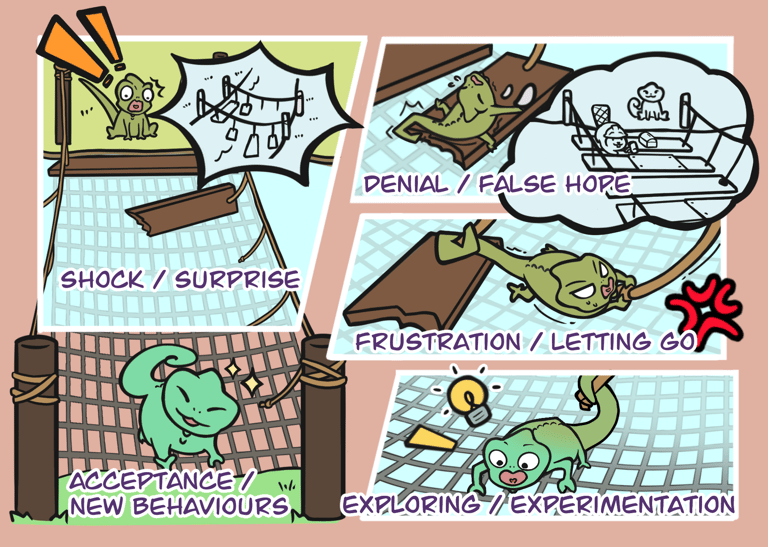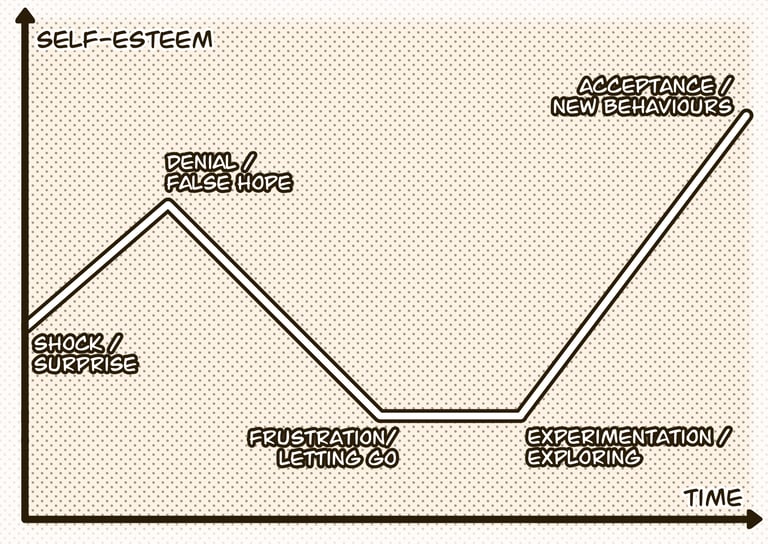Navigating Through Changes: John Fisher’s Change Curve Theory
FOUNDATIONAL CONCEPTS


In the early stages of John Fisher's Change Curve Theory, individuals often find themselves grappling with a whirlwind of emotions that can be profoundly unsettling. The journey commences with the Shock/Surprise phase, where the announcement or realization of impending change takes individuals by surprise. This initial shock can lead to feelings of disbelief and disorientation as people struggle to process the new information. This phase is typically marked by a temporary state of paralysis, where individuals find it challenging to comprehend the full implications of the possible change.
Subsequently, individuals progress into the Denial/False Hope stage. During this phase, there is a natural tendency to reject the reality of the change. People might cling to the hope that the change is not permanent and that things will revert to their previous state. This stage is characterized by resistance to the change and avoidance behaviors, such as ignoring new procedures or continuing to follow old routines. Denial serves as a coping mechanism, providing a buffer against the initial shock and allowing individuals time to adjust gradually to the new reality.
As the change becomes more concrete and undeniable, individuals enter the Frustration/Letting Go phase. Here, the reality of the situation sets in, and the recognition that the old ways of doing things are no longer viable leads to feelings of anger, anxiety, and helplessness. This phase is crucial in the emotional adjustment process, as it represents the beginning of a deeper confrontation with one's fears and insecurities. The frustration experienced during this stage often stems from the perceived loss of control and uncertainty about the future. However, it also marks a critical turning point where individuals start to let go of past practices or beliefs, paving the way for eventual adaptation and acceptance of the change.
The journey through John Fisher’s Change Curve reaches a pivotal point as individuals enter the Experimentation/Exploring phase. This stage is characterized by a shift from the initial shock and frustration toward a more inquisitive and proactive mindset. As the dust begins to settle, curiosity takes hold, prompting individuals to engage with the new reality. This engagement is often marked by a willingness to try new approaches, think differently, and adopt new behaviors. It is in this phase that the experimentation process unfolds, involving a series of trial-and-error activities. Through this iterative process, individuals learn to navigate the transformed environment and develop new skills or ways of thinking.
As individuals persist through the Experimentation phase, they gradually move toward the Acceptance/New Behaviour phase. Acceptance signifies the culmination of the change journey, where the new norm starts to solidify. In this stage, individuals fully embrace the change, and the new behaviors and ways of thinking become ingrained in their daily routines. This phase is often characterized by a renewed sense of confidence and competence as individuals feel more in control and aligned with the new circumstances. The acceptance phase represents a period of stability, where the emotional turmoil of earlier stages gives way to a harmonious adjustment to the new status quo.
Understanding the dynamics of these phases can significantly aid individuals and organizations in managing transitions more effectively. By recognizing and acknowledging the emotional journey involved, support systems can be better tailored to assist those navigating through change. This awareness fosters a more empathetic and supportive environment, facilitating a smoother transition and enhancing overall well-being. Embracing change through experimentation and acceptance is not just about adapting to new circumstances; it is about evolving and growing in the face of change, ultimately leading to a more resilient and adaptable mindset.
So... What changes are you going through?


Product of JEM wayoflife
UEN: 53307176C
Contact Us
Want to join the HAY community?
© 2024. All rights reserved.
